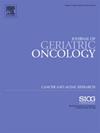老年癌症患者功能衰退的决定因素是什么?INCAPAC研究的结果
IF 3
3区 医学
Q3 GERIATRICS & GERONTOLOGY
引用次数: 0
摘要
导言:由于癌症本身、癌症治疗或两者兼而有之,患有癌症的老年人在进行日常活动时面临着更大的困难。本研究旨在描述癌症确诊后功能衰退的情况,并调查癌症老年患者功能衰退的决定因素。材料与方法利用吉伦特省癌症登记处,在三个老龄化前瞻性队列中确定了 2005 年至 2018 年期间确诊癌症的老年受试者(≥65 岁)。功能衰退的定义是:在癌症确诊前和确诊后两次就诊之间,日常生活活动(ADL)增加 1 分,工具性日常生活活动(IADL)增加 2 分,总分(ADL + IADL)增加 3 分。逻辑回归模型用于确定接受诊断后评估的老年受试者功能下降的决定因素。结果 共纳入 306 名癌症诊断后随访者(癌症诊断时的中位年龄:83 岁;44% 为女性)。在所有三项评分中,患癌年龄较大、教育程度较低、初始功能状态受损以及五年内癌症相关预后较差与功能衰退有显著相关性。多项式逻辑回归分析(n = 489)也得出了类似的结果,但只有癌症相关因素,特别是不利的重要预后,才与较高的死亡风险相关。需要进一步的研究来区分癌症和衰老的影响。本文章由计算机程序翻译,如有差异,请以英文原文为准。
What are the determinants of functional decline in older adults with cancer? Results from the INCAPAC study
Introduction
Older adults with cancer are exposed to greater difficulties in carrying out their daily activities due to cancer itself, its treatment, or both. The aim of this study was to describe functional decline after cancer diagnosis and to investigate the determinants of this decline among older individuals with cancer.
Materials and Methods
Using the Gironde cancer registries, older subjects (≥65 years) with a diagnosis of cancer between 2005 and 2018 were identified in three prospective cohorts on aging. Functional decline was defined as an increase of 1 point for Activities of Daily Living (ADL), 2 points for Instrumental Activities of Daily Living (IADL), and 3 points for the overall score (ADL + IADL) between cancer pre- and post-diagnosis visits. Logistic regression models were used to identify determinants of functional decline among older subjects who underwent a post-diagnostic assessment. Additionally, multinomial logistic regression models were performed to account for individuals who had died prior to the post-diagnostic cancer visit.
Results
A total of 306 individuals followed-up after the cancer diagnosis were included (median age at cancer diagnosis: 83; 44 % female). Older age at cancer, low educational level, impaired initial functional status, and poor five-year cancer-related prognosis were significantly associated with functional decline across all three scores. Multinomial logistic regression analyses (n = 489) yielded similar results, but only cancer-related factors, specifically unfavorable vital prognosis, were associated with higher risk of death.
Discussion
Functional decline in older individuals with cancer is both multifactorial and multidimensional. Further studies are needed to disentangle the effects of cancer and aging.
求助全文
通过发布文献求助,成功后即可免费获取论文全文。
去求助
来源期刊

Journal of geriatric oncology
ONCOLOGY-GERIATRICS & GERONTOLOGY
CiteScore
5.30
自引率
10.00%
发文量
379
审稿时长
80 days
期刊介绍:
The Journal of Geriatric Oncology is an international, multidisciplinary journal which is focused on advancing research in the treatment and survivorship issues of older adults with cancer, as well as literature relevant to education and policy development in geriatric oncology.
The journal welcomes the submission of manuscripts in the following categories:
• Original research articles
• Review articles
• Clinical trials
• Education and training articles
• Short communications
• Perspectives
• Meeting reports
• Letters to the Editor.
 求助内容:
求助内容: 应助结果提醒方式:
应助结果提醒方式:


